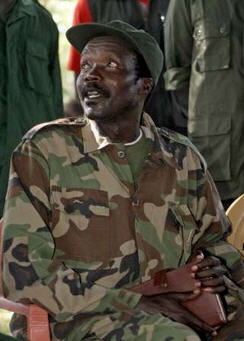LRA rebel leader Joseph Kony target of viral campaign video
By BBC News | Published March 7, 2012

Invisible Children's half-hour film on the use of child soldiers by Kony's Lord's Resistance Army has been viewed nearly 10 million times on YouTube.
The group aims to bring Kony to justice at the International Criminal Court, where he is charged with crimes against humanity.
Critics, however, have questioned the methods of the non-profit group.
The hashtags #stopkony and #kony2012 were among top trending topics on Twitter on Wednesday as the campaign took off.
A number of celebrities, including P Diddy and Rihanna, tweeted links to the video.
Kony's forces are accused of atrocities in four African countries: Uganda, the Democratic Republic of Congo, the Central African Republic and South Sudan.
US President Barack Obama in October 2011 announced he was sending 100 special forces soldiers to Uganda to help track down Kony.
However, Invisible Children was accused of spending most of its raised funds on salaries, travel expenses and film-making.
Bloggers also pointed out that NGO watchdog Charity Navigator had given the group only two out of four stars for financial accountability.
And an article in Foreign Affairs which accused Invisible Children and other non-profits of having "manipulated facts for strategic purposes" was circulated on the web.
Invisible Children posted a blog to answer the criticism.
Jedediah Jenkins, of Invisible Children, told the Washington Post that criticism of the group was "myopic".
Peace deal rejected
Joseph Kony and his close aides have been wanted by the ICC in The Hague since 2005.
Their campaign of terror began in northern Uganda more than 20 years ago when they said they were fighting for a biblical state and the rights of the Acholi people.
The LRA is listed by the US as a terrorist organisation and now operates mainly in neighbouring countries.
The group is notorious for kidnapping children, forcing the boys to become fighters and using girls as sex slaves.
Kony refused to sign a peace deal with the Ugandan government in 2008 when it could not guarantee the withdrawal of the ICC arrest warrants.
Related articles
- • 'Deadly environment' plus 'political and social' obstacles hinder Ebola fight, Security Council hears (July 24, 2019)
- • Ebola outbreak declared an international Public Health Emergency (July 17, 2019)
- • Jean-Pierre Bemba named MLC presidential candidate (July 13, 2018)
- • DRC Seeks Arrest of Presidential Candidate Moise Katumbi (May 19, 2016)
- • UN Report Blames Ugandan Islamists for 237 Killings in DR Congo (May 14, 2015)
- • ICC Confirms 14-Year Sentence Against Thomas Lubanga (December 1, 2014)
- • ICC Case Against Bemba Wrapping Up as Another Opens (November 12, 2014)
- • Violence in North Kivu Kills 21, Mostly Women, Children (October 18, 2014)
- • ICC confirms war crimes charges against Bosco Ntaganda (June 10, 2014)
- • ICC sentences Germain Katanga to 12 years (May 23, 2014)
- • Kerry Calls on Kabila to Honor Constitution (May 4, 2014)
- • Kerry in DR Congo for Security Talks (May 3, 2014)
- • Security Council extends UN mission, intervention force in DR Congo for one year (March 28, 2014)
- • Death toll in Lake Albert boat accident rises to 251 (March 27, 2014)
- • U.S. sending more personnel to Uganda to hunt LRA leader Joseph Kony (March 24, 2014)
- • Death toll in Lake Albert boat accident rises to 108 people (March 24, 2014)
- • ICC finds Germain Katanga guilty of war crimes and crime against humanity (March 7, 2014)
- • DR Congo Takes Chairmanship of COMESA at Summit in Kinshasa (February 26, 2014)
- • Bosco Ntaganda Attacked Civilians on Ethnic Grounds, ICC Prosecutor Says (February 10, 2014)
- • New DR Congo amnesty law welcomed by UN envoys (February 5, 2014)
- • Colonel Mamadou Ndala Is Killed in Ambush (January 2, 2014)
- • DR Congo, M23 Rebels Sign Declarations Marking End of Kampala Peace Talks (December 12, 2013)
- • No 'Peace Deal' With Defeated M23 Rebels, DR Congo Says (November 11, 2013)
- • Congo Will Not Sign a 'Peace Deal' With Defeated M23 Rebels, Government Says (November 6, 2013)
- • Congo Army Takes Control of Mbuzi Hill From M23 Rebels (November 4, 2013)
- • Kabila Congratulates Congo Army for Defeating M23 Rebels (October 30, 2013)
- • Congo Army Liberates Rutshuru, Kiwanja and Kibumba From M23 Rebels (October 27, 2013)
- • Congo Army Dislodges M23 Rebels From Strategic Town of Kibumba (October 26, 2013)
- • Congo Army Takes Control of Kibumba After Fighting With M23 Rebels Resumes (October 25, 2013)
- • U.S. Sanctions Rwanda Over Use of Child Soldiers by M23 Rebels (October 4, 2013)







